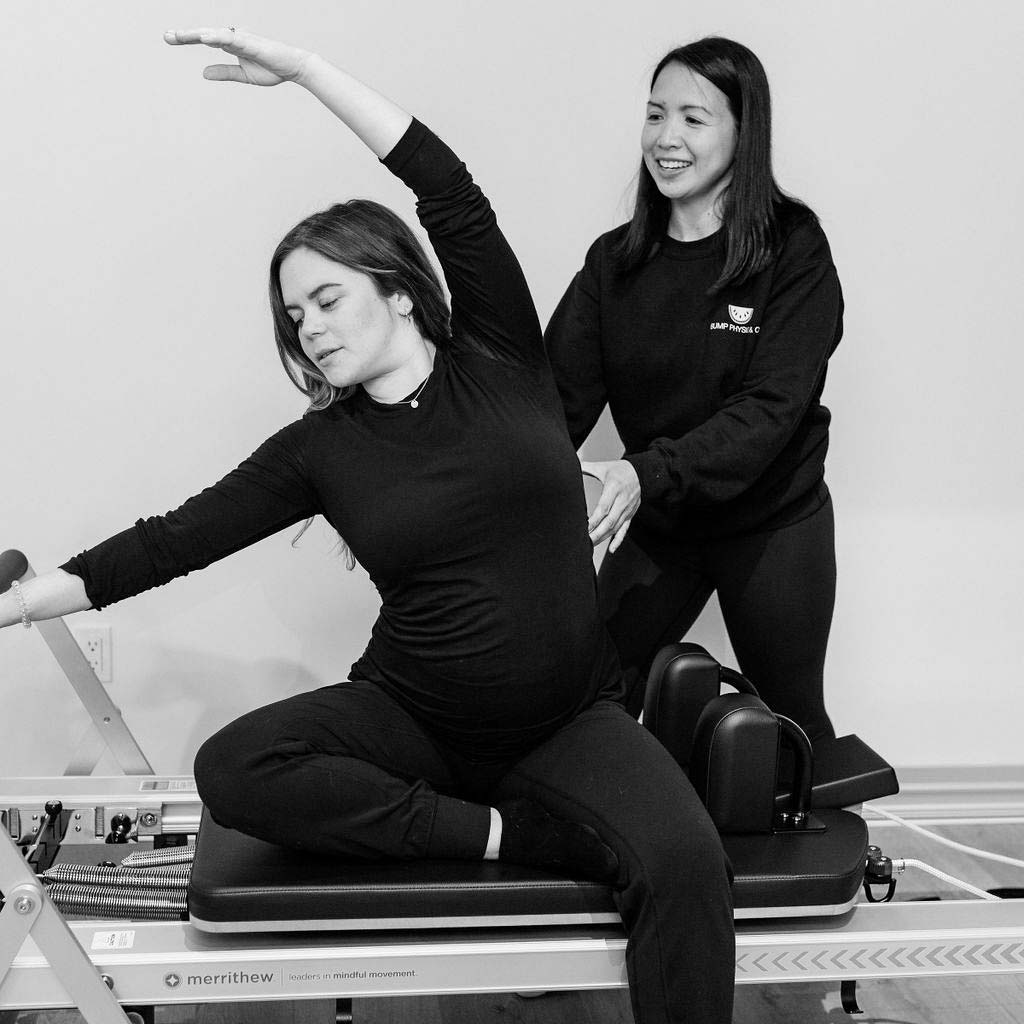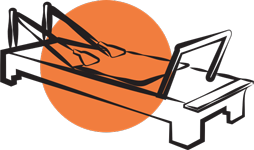
Breath & movement
Custom pilates programs
Why Clinical Pilates?
Clinical Pilates is a low-impact, effective technique that enhances the brain-body connection through mindful movement. By concentrating on breath, core strength, balance, and flexibility, it’s a suitable choice for many. Clinical Pilates aids in physical recovery and mental wellness, making it a great option for both rehabilitation and overall health and well-being.
The practice focuses on strengthening deep core muscles, including the transversus abdominis, diaphragm, oblique muscles, multifidus, and pelvic floor. Pilates is a whole-body approach that strengthens core stability, enhances movement control, and supports both spinal health and overall body alignment. It’s highly effective for improving postural control, core endurance, and full-body stability, making it ideal for rehabilitation, alignment, and overall strength.
Clinical Pilates vs Traditional Pilates
Clinical Pilates and traditional Pilates serve distinct purposes. Clinical Pilates is designed for rehabilitation and injury management. It is led by rehabilitation professionals including physiotherapists and kinesiologists who assess your individual needs and create personalized exercise programs. This method targets specific conditions using an understanding of anatomy and physiology. It also incorporates specialized equipment like reformers and Wunda chairs. On the other hand, traditional Pilates focuses on general fitness and overall wellness without the same level of medical oversight.
Benefits of Clinical Pilates
There are many benefits of Clinical Pilates including:
- Improved mind-body connection
- Increased strength and flexibility
- Better movement control
- Pain management
- Injury prevention and injury rehabilitation
- Enhanced stability and mobility
Using breathwork and movement-based exercises, Clinical Pilates helps you build strength, coordination, and control, all while improving your quality of movement.
How We Use Clinical Pilates
At Bump, we incorporate specialized equipment such as Merrithew Reformers, Pilates chairs, pilates props, and various mat exercises to help release tension, retrain muscles, and improve coordination. These tools help you unlock your full movement potential.
Individualized Approach
Whether you’re navigating pregnancy, postpartum recovery, or managing persistent pain, we take an individualized approach to Clinical Pilates. Our team combines Pilates principles, hands-on techniques, and corrective exercises to support many concerns including (but not limited to):
- Postural alignment
- Back pain
- Hip and shoulder pain
- Pelvic health concerns
- Acute and persistent injuries
Clinical Pilates may help with:
-
If low back pain is slowing you down and preventing you from fully enjoying life, whether it’s traveling, cooking your favorite meals, or playing pickleball with friends, you’re not alone. This discomfort can make even the simplest activities feel like a challenge, leaving you hesitant to participate for fear of worsening your pain. But it doesn’t have to be this way. You deserve to live an active, fulfilling life.
That’s where clinical Pilates comes in.
Clinical Pilates is highly effective in managing low back pain. Our therapists employ a combination of movement, breathwork, and core stabilization exercises to alleviate discomfort.
For instance, if you often feel pain when lifting objects, specific Pilates exercises can help strengthen your core and back muscles. This targeted approach not only aims to reduce your current discomfort but also works to prevent future pain by improving overall stability and function.
-
You might notice poor posture affecting your daily life. Whether you find yourself slouching at your desk, experiencing neck and shoulder tension, or feeling fatigued after long periods of time standing, your posture plays a significant role in your overall well-being.
Clinical Pilates is an incredible tool in our therapists’ toolboxes for enhancing postural awareness, control, and stability. By focusing on building a strong, stable foundation, we can improve your functional mobility and help prevent injuries. Using specialized equipment like the Wunda chair and reformers, we can isolate specific muscle groups to strengthen your core and back.
-
Clinical Pilates can be an effective approach to managing pelvic floor dysfunction. Focusing on breath control, core activation, and targeted exercises helps strengthen the pelvic region.
Pelvic floor dysfunction can result in symptoms such as incontinence, pain, or prolapse, which may impact your quality of life. Our physiotherapists utilize exercises that activate deep core muscles to promote improved pelvic floor function. This approach aims to improve muscle strength while also enhancing coordination and control.
At Bump, we use Clinical Pilates as part of a personalized rehabilitation plan to restore function and improve your overall confidence in daily activities. It’s a supportive, long-term solution for managing pelvic floor dysfunction and getting you back to feeling your best.
-
If you’re dealing with pelvic girdle pain, you know it can be a real challenge. Your daily life might feel like a juggling act, taking care of your kids and managing your home while coping with discomfort in your lower back, hips, or groin. You may notice that simple activities, like walking, climbing stairs, or rolling over in bed, are painful and difficult.
Pelvic girdle pain impacts the bones in your pelvis and can lead to symptoms that often worsen during daily activities. One common type of pelvic girdle pain is pubic symphysis dysfunction, especially prevalent during pregnancy. This occurs when the pubic symphysis—the disc in the front of your pelvis—moves too much, causing discomfort. At Bump, we use clinical Pilates as a way to help manage pelvic girdle pain, offering targeted exercises to improve mobility and ease discomfort.
-
A strong core matters! It’s essential for your stability, balance, and overall health. A well-conditioned core supports proper posture and helps prevent injuries, making everyday activities much easier.
If your core is weak, you might struggle with even simple movements, leading to discomfort and a greater chance of injury. Additionally, a weak core can result in persistent back pain, increase the risk of falls—especially in older adults—and contribute to pelvic floor issues like incontinence. Strengthening your core is key to preventing these challenges and enhancing your overall well-being.
Core strengthening is a key principle of Clinical Pilates. Many exercises focus on improving core stability, which is crucial for overall function and injury prevention. For instance, if you’re looking to improve your ability to participate in sports or recreational activities, a stronger core will enhance your balance and coordination. Our physiotherapists design customized exercises to build this essential strength, ensuring you have a solid foundation for movement.
-
Clinical Pilates emphasizes breath control, core strength, and pelvic floor engagement. This approach may enhance flexibility and stability. It incorporates diaphragmatic breathing techniques that train the body to take deep, controlled breaths which are extremely beneficial during labour. These skills may help make the birth process feel more manageable and help you feel in control during the birthing process.
Moreover, recent research has shown that practicing Clinical Pilates regularly during pregnancy may:
- Reduce perceived labour pain
- Shorten the active phase and second stage of labour
- Increase the likelihood of vaginal delivery
- Reduce the risk of c-section
- Improve one’s overall satisfaction with the childbirth experience
-
Postpartum recovery is a journey that takes time, and it’s completely normal to feel and move differently after carrying and birthing a baby. Your body has gone through so much, and adjusting to these changes can be challenging. Clinical Pilates offers gentle support to help rebuild your strength and boost your confidence as you adapt to the new demands of parenthood.
Clinical Pilates helps build endurance while strengthening your core, pelvic area, and posture. This is crucial during postpartum recovery, as endurance is often needed to keep up with the physical demands of caring for a newborn. Incorporating Clinical Pilates into your recovery plan alongside pelvic floor physiotherapy or massage therapy can provide the stamina and support you need during this time. Here’s how it can help you reconnect with your body:
- Strengthening Your Core: After giving birth, your core muscles may feel weak or disconnected. Clinical Pilates incorporates targeted exercises that engage and strengthen these muscles.
- Supporting Pelvic Floor Recovery: Your pelvic floor undergoes significant changes during pregnancy and childbirth. Pilates includes specific exercises that enhance pelvic floor awareness and strength.
- Improving Posture: With all the changes to your body, posture can be impacted postpartum especially when breast or chestfeeding. Clinical Pilates emphasizes proper alignment and body mechanics. Your physiotherapist may introduce exercises to help you regain awareness of your posture, making daily activities like nursing or carrying your baby easier and more comfortable.
- Promoting Flexibility and Mobility: Your body has experienced a lot, and stiffness may be an issue. Pilates includes movements that promote flexibility and mobility in your joints and muscles.
-
Diastasis recti is a common condition many experience during and after pregnancy. It occurs when the abdominal muscles stretch, leaving a gap in the middle of your belly. In fact, by the end of pregnancy, 100% of individuals will have some degree of stretching in this area. While this is completely normal, it can leave you feeling like your core isn’t quite what it used to be.
Clinical Pilates can support your healing journey and strengthen your core through:
- Focused Core Stabilization: Clinical Pilates emphasizes core stabilization, which is crucial for managing diastasis recti. Our physiotherapists will guide you through specific exercises that activate the deep abdominal muscles. These exercises help to retrain your core, bringing the muscles closer together and supporting the healing process.
- Breathwork Integration: Breath is a powerful tool in Pilates. Incorporating diaphragmatic breathing techniques can enhance your core engagement.
- Gentle Progression of Movement: Clinical Pilates takes a progressive approach to rebuilding strength. We start with gentle movements that focus on connecting with your core without straining your body.
- Targeted Strengthening Exercises: Once you’re ready, we can incorporate more targeted exercises that focus on both the rectus abdominis (the “six-pack” muscles) and the transverse abdominis (the deeper core muscles).
-
A C-section is a significant surgery that often affects the muscles in your core, lower back, and pelvic floor, potentially leading to issues like pelvic floor dysfunction or core weakness. Approximately 50% of individuals who have undergone a C-section experience pelvic floor dysfunction postpartum.
Clinical Pilates can be a helpful part of recovery, offering specialized exercises to address concerns like restricted movement from scar tissue and weakened muscles. For example, gentle movements can help improve fascial mobility around the incision site, while targeted core activation supports stability and strength. This focused approach encourages functional recovery, making daily activities more comfortable as your body heals post-delivery.
-
Clinical Pilates can be an effective rehabilitation method for individuals recovering from motor vehicle collisions. This approach helps improve mobility and strength while addressing pain or restrictions resulting from the accident. Your Bump physiotherapist will assess your specific needs and develop a personalized treatment plan based on your injuries. Whether you’re dealing with whiplash, back pain, or muscle strains, Clinical Pilates can play an important role in restoring function and helping you reclaim the activities you love. Ask your physiotherapist or RMT if Clinical Pilates is appropriate for you.
ICBC provides physiotherapy, massage therapy, kinesiology, and registered clinical counseling treatment coverage for customers who have been injured in a motor vehicle collision through their Enhanced Care Program. Learn more about how Bump can support your crash recovery here.
Clinical Pilates
| Service Duration | Service Cost |
|---|---|
| Initial Assessment (55 min) | $195 |
| 40 min | $145 |
| 25 min | $110 |
